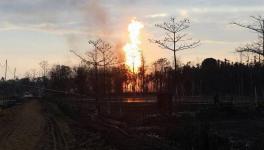NGT Committee Calls Baghjan Oilfield Illegal
The Baghjan oilfield, which has been burning since the last 160 days, was operating without mandatory environmental clearances when one of the wells experienced a blowout on May 27, 2020, followed by a fire, a National Green Tribunal (NGT) committee said on November 3. The committee has rendered the entire Baghjan oilfield, with 26 oil wells, illegal.
The leakage that caused the fire in May was a result of the failure of the pressure control system and Oil India Limited (OIL) sprayed cold water on the leaking gas and oil in order to prevent it from igniting. However, since the temperature in the state was on an upward curve at the time, the cold water spray appeared to be insufficient to prevent it from ignition which resulted in the consequent blast.
On November 3, Judge Katakey submitted a status report on the ongoing investigation into the cause and impact of the blowout. The committee has recommended a payment of Rs 25 lakh to 173 families and Rs 20 lakh to 439 families identified by the district administration. The authorities found that 57 houses were completely gutted during the explosion June 9, when the spilled gas condensates and crudes caught fire. It was also found that a pregnant woman living in the vicinity suffered from a miscarriage. Similar instances of miscarriages were also reported among cattle and the endangered Hoolock Gibbon in the neighbouring forests.
The blowout site, located next to the Dibru Saikhowa National Park (DSNP) in Tinsukia district, has been burning for 160 days, and continues to impact an area of 10 kilometres around the controversial Baghjan 5 oil and gas rig. A committee of experts headed by Justice Brojendra Prasad Katakey was constituted by the NGT in June to look into the blowout and explosion. This committee was constituted after Kolkata-based activist Bonani Kakkar and Wildlife and Environment Conservation Organisation, an Assam-based non-profit, approached the tribunal.
The committee submitted a preliminary report to the Tribunal on July 24, which said that the oil blowout and the subsequent fire could have been prevented. The report said that there was a deficiency in understanding the gravity of a critical operation like removal of blowout preventer without having a confirmed and tested secondary safety barrier. It added that there had also been a deficiency of proper planning of critical operations. The committee pointed out that there was a clear mismatch between planning and its execution at site and deviations from the Standard Operating Procedure.
Also read: Baghjan Oil Well: Nearly 2 Months After Explosion, Fire Continues to Rage
On the day of the blowout of well Baghjan-5 (May 27, 2020) and subsequent explosion (June 9, 2020), OIL did not have the mandatory Consent to Establish and Consent to Operate both under Section 25 & 26 of the Water (Prevention & Control of Pollution) Act, 1974, under Section 21 of the Air (Prevention & Control of Pollution) Act and the Rules framed thereunder and/or the authorization Rule 6 of the Hazardous Waste (Management, Handling and Transboundary Movement) Rules, 2016.
OIL, however, has claimed it had secured all the necessary environment and industrial clearances to operate near DSNP from the Baghjan oilfield consisting of 26 oil wells. The committee, though, found OIL to have violated terms under which such clearance had been granted to it.
On September 7, 2017, the Supreme Court permitted OIL to extract hydrocarbons from near the DSNP while delivering the landmark verdict in the TN Godavaram case. The case acts as a deterrent to any kind of industrial activity near protected areas such national parks and wildlife sanctuaries. The apex court had granted a conditional approval to OIL, stating that the company should carry out a biodiversity impact assessment before commencing extraction of hydrocarbons.
The Katakery Committee found that OIL did not carry out assessment, nor did it approach the apex court, seeking a final clearance for its extraction activities near the DSNP.
Get the latest reports & analysis with people's perspective on Protests, movements & deep analytical videos, discussions of the current affairs in your Telegram app. Subscribe to NewsClick's Telegram channel & get Real-Time updates on stories, as they get published on our website.

















